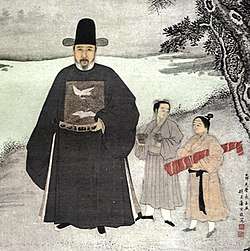Scholar-official
Scholar-officials, also known as literati, scholar-gentlemen or scholar-bureaucrats (Chinese: 士大夫; pinyin: shì dàfū) were politicians and government officials appointed by the emperor of China to perform day-to-day political duties from the Han dynasty to the end of the Qing dynasty in 1912, China's last imperial dynasty. After the Sui dynasty these officials mostly came from the scholar-gentry (紳士 shēnshì) who had earned academic degrees (such as xiucai, juren, or jinshi) by passing the imperial examinations. The scholar-officials were schooled in calligraphy and Confucian texts. They dominated the government and local life of China until the early-20th century.

| Part of a series on |
| Intellectualism |
|---|
|
Social/Technical
|
|
Ethnic/National |
|
Countermeasures
|
Non-governmental functions
Since only a select few could become court or local officials, the majority of the scholar-literati stayed in villages or cities as social leaders. The scholar-gentry carried out social welfare measures, taught in private schools, helped negotiate minor legal disputes, supervised community projects, maintained local law and order, conducted Confucian ceremonies, assisted in the governments collection of taxes, and preached Confucian moral teachings. As a class, these scholars claimed to represent morality and virtue. The district magistrate, who by regulation was not allowed to serve in his home district, depended on the local gentry for advice and for carrying out projects, which gave them the power to benefit themselves and their clients.
Evaluations
Theoretically, this system would create a meritocratic ruling class, with the best students running the country. The examinations gave many people the opportunity to pursue political power and honor — and thus encouraged serious pursuit of formal education. Since the system did not formally discriminate based on social status, it provided an avenue for upward social mobility. However, even though the examination-based bureaucracy's heavy emphasis on Confucian literature ensured that the most eloquent writers and erudite scholars achieved high positions, the system lacked formal safeguards against political corruption, only the Confucian moral teachings tested by the examinations. Once their political futures were secured by success in the examinations, officials were tempted by corruption and abuse of power.
The Princeton scholar Benjamin Elman writes that some criticized the examination elite as hindering China's development over the last century but that preparing for the examinations trained government officials in a common culture and that "classical examinations were an effective cultural, social, political, and educational construction that met the needs of the dynastic bureaucracy while simultaneously supporting late imperial social structure."[1]
See also
- Bildungsbürgertum
- Cabang Atas, the Chinese gentry of colonial Indonesia
- Four arts
- Junzi
- Kuge
- Mandarin
- Yangban, the Korean form of the scholar-official
Notes
- Elman (2009), p. 405.
References
- Elman, Benjamin A. (2009), "Civil Service Examinations (Keju)" (PDF), Berkshire Encyclopedia of China, Great Barrington, MA: Berkshire, pp. 405–410CS1 maint: ref=harv (link)
Further reading
- Esherick, Joseph and Mary Backus Rankin (1990). Chinese Local Elites and Patterns of Dominance. Berkeley: University of California Press. ISBN 0520067630.. Free online text.
- Max Weber, The Religion of China: Confucianism and Taoism (1916; transl. 1951)
- Jerry Bentley and Herb Ziegler. Traditions and Encounters - A Global Perspective on the Past.
- Zhang, Zhongli (1955). The Chinese Gentry; Studies on Their Role in Nineteenth-Century Chinese Society. Seattle: University of Washington Press.
External links
| Look up scholar-official in Wiktionary, the free dictionary. |
- Late Qing China: Reform and Rebellion (1898 -1900)
- Reunification and Renaissance in Chinese Civilization: The Era of the Tang and Song Dynasties
- The Chinese Scholar-Official Education About Asia, Columbia University.